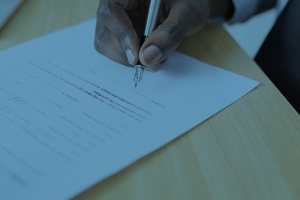Whether you are renting your entire home, a private space in your home or looking for a home exchange, it’s important to know certain things about your prospective tenant before deciding if it is a good fit. Who will be staying at your property? What is their background? And will they be good tenants that take care of your home?
One of the benefits of the SabbaticalHomes.com community is that many people on the site have been referred by other members. Most members are motivated to do the right thing when looking for a place to stay, since they may have others staying in their home as well at some point. However, it is still important to be cautious, and it can be difficult to determine whether a potential tenant is suitable based on a few short interactions.
Along with contacting their references and confirming that the tenant is financially reliable, here are some key questions to help you assess whether a potential tenant is trustworthy and responsible – and most importantly, a good fit for you and your home. Many tenants also request references for their potential landlord. Part of the strength of SabbaticalHomes is the respect our members have for each other and the thought that goes into making a match.
Related: Checking References: The First Step to a Successful Stay
Key Questions: Tenants’ Needs & House Rules
1. When would you like to move in and how long is your stay?
Knowing when a tenant is looking to move in is often the first question, as this can quickly weed out any members whose start or end dates do not match up with yours. Discussing initial dates will often be taken care of when exchanging messages on SabbaticalHomes.com, but is an important first step towards seeing how others communicate.
You can also discuss if there is any flexibility for the stay; this is the time to set boundaries and create a common agreement, prior to further conversation, reference checks and creating a contract to sign.
2. Why are you traveling and looking for a temporary home?
Understanding the reason why the prospective tenant is looking is a great way of knowing whether there were past issues that forced them to look for a new place. Most people on SabbaticalHomes.com will be looking for temporary housing for research, a sabbatical, a relocation or pleasure travel, but it is always smart to make sure that a tenant has not created problems with their previous living arrangements.
One good reason for someone to be looking for a temporary home may be the destination of their sabbatical, for example near a university where they will be working. If their goal is to find a writing retreat, that could be in any location across the globe. If the tenant is looking for a longer-term home in the same location, perhaps the tenant is looking for more space or to move closer to work to avoid a long commute.
Answers that might indicate a red flag will be ones that involve issues with previous roommates or landlords, or the suggestion that they were evicted from a previous place. Be sure to always carry out a thorough background check to further understand the potential tenant’s situation.
Related: Home Rental, Home Exchange, & Vehicle Use Agreement Guidelines
3. Will anyone else be traveling or living with you? Can you provide an emergency contact?
Gather more information from your potential tenant so that you get a clear picture of their travel plans and accommodation needs.
Having an idea of who will be staying in the property (in addition to the prospective tenant) is an important question to ask. It can quickly let you know if the number of intended inhabitants for the home is even feasible. Does it make sense given the size of the place? And more importantly, is it legally possible or are building codes or laws violated?
Knowing who else besides the prospective tenant will be staying in the property can also help inform background checks and references that may be needed for the additional occupants.
Other questions related to this topic can be if they are traveling with young children or need other accommodations in a home. It’s also a good idea to ask any potential tenants if they can provide emergency contact information, in case a situation comes up in which you must reach them.
4. Do you have any pets traveling?
You have probably established what you are comfortable with in your home when you created your home listing. Be sure to communicate your expectations and any restrictions on pets and the number of pets in your home or building.
If the property in question is not set up to have pets stay or one of your house rules is “no pets,” asking this question early can quickly eliminate any prospective tenants looking to bring their animals with them or can alert them that they may need to find an alternative place for their pet if they are planning a short stay.
If pets are allowed, then this question allows you to discuss any additional security deposits required for having pets live on the property. These deposits could include potential damage and deposits for any additional cleaning needed, and should be noted in any final contract.
Related: 5 Simple Hacks for Sabbatical Homes Dog Parents When Traveling With Pets
5. Do you smoke?
This is an often overlooked but very important question to ask. It will allow you to discuss your boundaries, such as smoking on the porch only or not allowing smoking at all in your home. Some buildings do not allow smoking and knowing if the prospective tenant smokes can save both parties time.
If allowed in the space, some people include a separate cleaning deposit related to smoking as well as outlining specific smoking policies in their contracts.
Some tenants may say they do not smoke but are casual smokers or may have friends over who may smoke, so it is always smart to be extremely clear about house rules regarding smoking and to include some details related to smoking in the rental or lease agreement.
6. Will you need parking or access to any other amenities?
Asking if they require parking or other available amenities is a good way to understand the prospective tenants’ expectations of what they are looking to receive. Some tenants may assume parking is included, so it is good to have this clarified early.
Similarly, if the property comes with additional amenities such as a building gym or pool – it’s useful to outline whether these are included in the rent or can be used with any additional fees.
Important Tenant Questions: Income, Background/Credit Checks and More
7. How are you funding your travels?
A strong indicator of whether a tenant will pay rent on time is if they are employed or have a stable source of monthly income through some other means. As a landlord, having peace of mind when it comes to this is crucial, and it’s not worth showing leniency. Always ask for employment verification letters that list current annual salary and the duration and type of employment. If the tenant is not employed, ask for at least the past three months of bank statements to evaluate their financial standing.
A guiding rule to evaluating whether the prospective tenant is financially suitable is to ensure that their monthly gross salary is at least three times their monthly rent. If there are doubts about whether the prospective tenant has the financial means to pay rent for the duration of the lease, include safety deposit clauses such as having the first few months of rent provided in advance.
8. What kind of work do you do, and what is your employment history?
Take some time to understand their professional pursuits. You might happen to know someone in common or be able to connect them to a local resource. If your potential tenant is affiliated with a university, this is a natural time to ask more about what they are focusing on during their stay and point out other related resources like museums or academic libraries in your city.
Some scholars may be using this time to re-energize their career or devote themselves to a writing project. And some may be teachers or professors who have received a grant and are looking for housing in another location for the duration of their fellowship or grant.
Related: 20 Higher Education and Teacher Travel Grants.
9. Are you open to a credit and background check?
Understanding a potential tenant’s credit history helps determine if he or she can afford the rental price you are asking and gives you a good idea of their creditworthiness and overall background. It is appropriate to ask them to submit a credit report during the application process. Check to see if they are willing to consent to this. The credit check will show if they’ve historically always paid any bills on time.
Remember, credit checks will vary from country to country. Some countries in Europe, for example, don’t even require credit checks to be performed. You want to make sure that the questions you are asking your prospective tenants concerning credit checks are in line with regulations in your region.
Additionally, ask if they are open to having a background check performed on them. This check will show if the prospective tenant has had any past criminal records or been evicted from any previous rentals.
Asking consent for both of these checks can quickly eliminate any prospective tenants that are not open to this since refusal could indicate that they may have some credit or background history that makes them unsuitable candidates. If the prospective tenant does provide consent, be sure to get this in writing and outline clearly the credit and background checks you are going to perform, as well as the information you will need from them.
Related: Experian Credit Check
*SabbaticalHomes.com has no relationship and would receive no financial gain if you use Experian or another service for a credit check. SH.com members are responsible for performing their own credit checks on potential tenants, and this is one service that members can use.
10. Will you provide a copy of your passport?
A copy of identification is helpful to verify the legitimacy of your potential tenant. It is the law in some countries, such as Italy, to provide a passport to a potential landlord if you are a foreigner. Additionally, most airlines require a passport number to book an international flight. Similarly, it is fair for you as a homeowner to request to see a passport in order to confirm that a tenant is eligible to come to your country and stay in your home.
If you are renting your home to a potential tenant, you should also be prepared to provide a copy of your own passport and be prepared to have the tenant request to run a background check on you as well. Ideally, both parties have had several conversations prior to exchanging important documents like a passport so that you are fairly far in the process of negotiating your terms together.
11. Can you provide references?
It is important to check references to verify the details you have collected about your potential tenant. Along with the previous credit and background checks, asking the prospective tenant if they can provide references is important in ensuring you have carried out the necessary character inquiries on him or her.
Asking for an employer reference can allow you to evaluate the character of the tenant, such as their work ethic, reliability, and trustworthiness. How they perform and behave at work can be a good indicator of how they will treat the relationship with their landlord too.
Asking for a reference from their previous landlord will allow you to easily understand what sort of tenant this applicant was in the past. For example, did they pay their bills on time and take care of the place well? A landlord reference can provide strong contextual information on whether the prospective tenant is a good fit to take care of the property. Some good questions to ask the previous landlord are:
- Was rent paid on time?
- Any complaints from neighbors?
- Any damage to the property?
- Would you rent to him/her again?
- Anything else I should be aware of?
Not everyone has a landlord (i.e. if the other member is a homeowner), but they may be able to provide additional references from work or professional associations to corroborate the information they have provided.
12. If a pipe broke inside the home and began to flood, what would you do?
This “what if” question helps you to understand how your tenant might react to potentially stressful home-related situations. If the potential tenant has not been in any situation of managing home repairs, you may decide they are not the right fit for your home depending on the age and quirks of your house or building.
Or, you may decide that tenant is a good fit, but provide more information to them so they have some resources in case they need it. It can be helpful to provide a list of emergency instructions and contacts, possibly a neighbor or handyman who the tenant could call if you plan to be traveling during the same time period.
Related: Top 10 Things to do to Prepare for Your Tenant
Maintaining Open Lines of Communication
Overall, as you have this discussion, we recommend keeping open lines of communication so potential tenants can ask their questions or bring up concerns.
At SabbaticalHomes.com, the dialogue prior to arranging a rental or home exchange sets the tone. Asking these key questions to a prospective tenant can quickly help eliminate any candidates who are not the right fit for you, and will give you the framework to get to know more promising potential clients.
It also allows both members to outline expectations from the start, which is the best way to ensure a good match!
Related: Finding the Perfect Match
Let us know what you think! Connect with us on Twitter, LinkedIn, Facebook, Instagram, YouTube and Pinterest.





